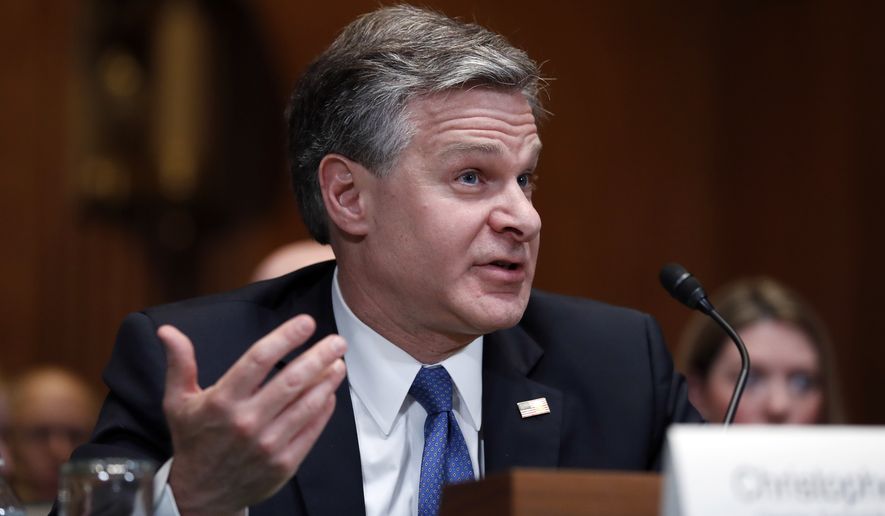FBI Director Christoper Wray said Wednesday that he believes a compromise can be reached resolving the so-called “Going Dark” problem caused by criminals using encrypted messaging platforms and mobile devices to obfuscate their communications from investigators, but that legislation would have to be considered if other proposals come up short.
Mr. Wray made the remarks while reiterating his concerns about the “growing problem” posed by the ongoing encryption dilemma during a discussion held with NBC News’s Lester Holt during an annual conference in Colorado.
“Now, we’re committed to strong encryption. We have a cybersecurity mission, too. So we have to figure out a way to square that circle and do both. But I have been encouraged by some of the feedback we’ve gotten from a variety of quarters, that, if people actually put their heads together, that there are solutions to be had,” Mr. Wray said at the Aspect Security Forum.
“I think if industry and government put their heads together… I really believe that this is the kind of thing that, if people go into the conversation with a goal of trying to solve the problem as opposed to trying to exacerbate the problem, we’ll get there,” Mr. Wray continued.
Devices and communications secured by tough encryption are typically illegible to authorities without the credentials used to protect that particular data — like the password to a criminal suspect’s encrypted smartphone, or the private keys used to safeguard messages sent using encrypted software and apps — but law enforcement agencies have occasionally paid professional hackers to decipher encrypted content, including most notably when the FBI contracted a company in 2016 to crack into an Apple iPhone owned by a man suspect held responsible for suspected terrorist attack in San Bernardino, California.
Officials during both the Obama and Trump administration discussed mandating otherwise-encrypted devices and protocols to have “backdoors” that could be accessed by law enforcement. Cryptologists have cautioned that that proposal and others would create vulnerabilities rendering them insecure and exploitable to hackers, however, and report released earlier this month by the European Council on Foreign Relations concluded that finding a balanced solution on the issue of encryption “is neither feasible nor, in fact, desirable.”
Contrary to claims raised by encryption experts, Mr. Wray said Wednesday that he believes that a technical solution is possible.
“And if we can’t get there, there may be other remedies, like legislation, that would have to come to bear,” he added.
“I really do believe that if people come at it with a goal that I think we all share of having both strong cybersecurity and protecting flesh-and-blood Americans – again, there’s a way to do this. We’re a country that has unbelievable innovation. We put a man on the moon. We have the power of flight. We have autonomous vehicles. The number of things that are created every day in this country really defies imagination sometimes. And so the idea that we can’t solve this problem as a society — I just don’t buy it.”
While the Obama administration considered pushing for legislation that would require tech companies to decrypt messages for investigators, those efforts while abandoned in 2015, former FBI Director James Comey said previously. President Trump’s administration rehashed potential encryption laws in recent months, however, and Attorney General Jeff Sessions said in May that, “Ultimately, we may need Congress to take action on this issue.”
Mr. Sessions, Mr. Wray and Deputy Attorney General Rod Rosenstein each previously said that the FBI lawfully seized upwards of 7,000 mobile devices during 2017 that were encrypted or secured in a manner that prevented authorities from accessing their contents. More recently, the Department of Justice conceded in May that the figure was actually less than 2,000 and that “programming errors resulted in significant over-counting of mobile devices.”
• Andrew Blake can be reached at ablake@washingtontimes.com.




Please read our comment policy before commenting.